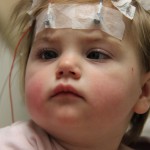Rett Syndrome In Children
 Rett syndrome is a neurological and developmental disorder that mostly occurs in females. This disease directly affects the grey matter of the brain. Infants with Rett syndrome seem to grow and develop normally at first, but then stop developing and even lose skills and abilities subsequently.
Rett syndrome is a neurological and developmental disorder that mostly occurs in females. This disease directly affects the grey matter of the brain. Infants with Rett syndrome seem to grow and develop normally at first, but then stop developing and even lose skills and abilities subsequently.
For instance, they stop talking even though they used to say certain words. They lose their ability to walk properly. They stop using their hands to do things and often develop stereotyped hand movements, such as wringing, clapping, or patting their hands. All this is due to the fact that the coordination between brain and body is lost or reduced.
Rett syndrome is considered one of the autism spectrum disorders. Most cases of Rett syndrome are caused by a mutation gene, which is found on the X chromosome. Beginning between 3 months and 3 years of age, most children with Rett syndrome start to show some of the following symptoms:
The child suffers loss of purposeful hand movements, such as grasping with fingers, reaching for things, or touching things, they have problem of coordination of movement and consequent loss of ability to walk. These children also suffer loss of speech, loss of intellect, associated with anxiety and improper behaviour is noticed. In acute cases the child develops breathing problem due to lack of coordination by brain.
The other problems common among those who have Rett syndrome includes:
Curving of the spine occurs in approximately 80 percent of girls, they also suffer from constipation and gastro problem. Sleep disorder, irregular heart beat followed by cardiac problem. The problem of chewing and eating also occurs. Towards end the individuals may become stiff or lose muscle tone, some may become immobile but having some of these problems is not necessary to get a diagnosis of Rett syndrome.
Most girls with Rett syndrome live until adulthood. They will usually need care and assistance throughout their lives. There is currently no cure for Rett syndrome. However, girls can be treated for some of the problems associated with the condition. These treatments generally aim to slow the loss of abilities, improve or preserve movement, and encourage communication and social contact. Other options, such as medication for constipation or heart problems or surgery to correct spine curvature or correct heart defects are also effective for treating some of the symptoms of Rett syndrome.